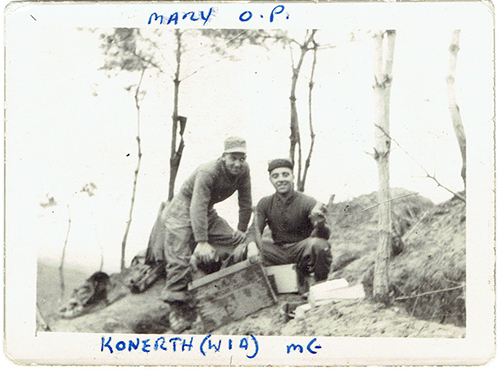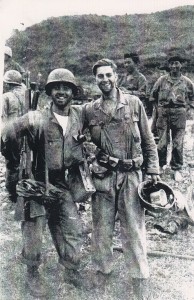- Oscar Konnerth with Dan on Outpost Mary
What Happened to Oscar Konnerth?
Chorwon Valley, Korea March 1952
The Zenith Transoceanic (a wet cell battery radio) was turned off as the sun began to sink behind the mountains of Chorwon Valley. Remnants of sunlight faded the stars, but soon they’ll begin to twinkle in the blackened sky, and insects will perform their nocturnal symphony.
It was Company L’ s turn to guard Big and Little Nori, two outposts in Korea which overlooked the mine-sown slopes of the Chorwon Valley. The Imjin River flowed directly behind us.
Sometimes the Chinese infantrymen would terrorize us with the clanging of cowbells; sometimes they used whistles, or bang on large, empty cans. Sometimes they tried to capture the outpost. They were masters in the art of harassment and attack. They should have been. The Chinese were at war with China since the 1930s when I was in elementary school.
In the evening, Oscar, Charlie and I were sitting low in the trenchline nibbling on our C-rations. I couldn’t believe that I was getting accustomed to the salt and slop. Suddenly, the familiar whishes streaked overhead. They were the sounds of incoming mortar rounds slicing through the air. Expecting an assault, we scattered for our weapons. Grenades were the best weapon we had against an unseen enemy. They did not reveal our position, but caused a great deal of damage. The Chinese were letting us know that we were not alone. Charlie and Oscar scrambled to their nearby positions.
Charlie came from a single parent home. He dropped out of high school then made the Army his career. His resume was composed of all the prejudices that were scattered throughout the U. S. Army. Discipline was a word missing from his persona. After twelve summary court martials, he stopped counting he said, because he was poor in math. Charlie always volunteered to be the point man on any mission. I was the runner for our platoon. When he stood alone in a contested area, I was the contact between him and our platoon leader. We formed a very good team. He was in the forefront and I was his messenger.
Oscar Konnerth was as dependable as Charlie when we were under fire. We knew he would fire his weapon and not give ground. He was a sweet guy who never complained. A sadist chef must have been the one who created Corned Beef Hash or Ham and Lima Beans, but to Oscar, any C-ration can was as good as the other. I spent three evenings with him and Charlie on Outpost Mary. Oscar missed his wife and friends, but we never spoke about our future. Did we subconsciously think one of our missions would be our future?
On the third day, Korea’s relentless rains came. I tried to waterproof myself, but no matter how I shifted my poncho, water would find a space to drench my fatigues.
During the downpour, muddy rainwater began to rise from the bottom of the trench. It became a muddy pond. My boots became spongy. Aside from my sweat, my socks, fatigues and underwear felt water for the first time since we were brought to a shower point three weeks ago. Behind us, the tranquil Imjin was flowing so rapidly that wavelets with white crests were bursting at their peaks. It was in a rush to go west. There wasn’t a chance that our jon boats could get us back to the opposite shoreline where our bunkers waited.
Late at night, after incoming had relented, Charlie took it upon himself to check if there were any casualties. He returned to tell me that Oscar Konnerth was missing. What happened to him? Was he severely wounded? No one knew.
Six days had passed. The only remaining C-rations I had left was Corned Beef Hash and some crackers, and jam. The crackers and jam became dinner after I hurled the Corned Beef Hash down the forward slope towards the Chorwon Valley.
On the seventh day, when the rain let up, a single-engine plane flew by, dipped, and dropped two cardboard cartons of C-rations. Small weapons were fired by Chinese riflemen, but, unfortunately they missed the boxes of C-rations..
The schedule for a company manning these outposts was five days. After ten days the Imjin’s surge had subsided. I went to Oscar’s position in the trenchline and picked up the only trace that he was there, his rifle and a few magazines for his M1.
The jon boats were waiting for Company L. By an overhead rope, we pulled ourselves across the river. I couldn’t believe I’d be so happy to see my bunker. But, what happened to Oscar Konnerth?
Forty years later, at our company’s first reunion, Oscar Konnerth entered the reception with his wife. We embraced, and then I jokingly asked him if he “bugged out” when we were guarding Big Nori. He lifted a pants leg and showed me a gray plastic brace near his calf. A piece of shrapnel entered his rear end and into his leg. He was evacuated to Tokyo Army Hospital then returned stateside.
Finally, leaving Big Nori with Joe Karas. I am carrying Oscar’s rifle.
For the complete story read Cold Ground’s Been My Bed: A Korean War Memoir.
danielwolfebooks@aol.com

